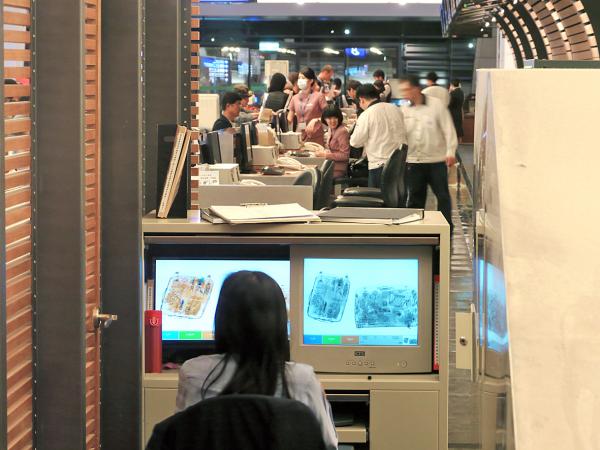《TAIPEI TIMES 焦點》Luggage inspector mistakes diesel for honey, prompts inspections overhaul

A woman monitors luggage inspection displays at Taiwan Taoyuan International Airport yesterday. The Aviation Police Bureau said yesterday it is enhancing the luggage inspection procedures following a revelation that a Japanese passenger was able to carry diesels in the check-in luggage last month. Photo: Yao Chieh-hsiu, Taipei Times
By Shelley Shan / Staff reporter
Luggage inspection procedures at Taiwan Taoyuan International Airport, the nation’s largest airport, are being enhanced after it came to light that a Japanese passenger was able to carry diesel in his check-in luggage without it being discovered because the safety inspector had mistaken the liquid for honey, the Aviation Police Bureau said yesterday.
According to the bureau, the passenger boarded a Cebu Pacific Air midnight flight heading to Manila on April 20, and his check-in luggage containing 7.5 liters of diesel was scanned by an X-ray machine at the airport at 11:41pm on April 19. The banned substance was not discovered until after the flight landed in Manila, when the diesel started leaking from the luggage.
“The X-ray machine showed that the two cans in the luggage contained an organic substance of yellow-orange color,” the bureau said. “As many passengers heading to Southeast Asian countries often carry honey, which has a yellow-orange color, in their check-in luggage, the inspector did not pull the luggage out to examine it. This was indeed a major error.”
The bureau said that it has removed the safety inspector, surnamed Tu (杜), from the position for failing to spot such a dangerous item and allowing it to be carried onto an aircraft, adding that it has ordered all the other airports to thoroughly enforce luggage inspection regulations.
Based on the nation’s civil aviation regulations, passengers are banned from carrying gasoline or related products in either their check-in or carry-on luggage.
Several airline companies said that the incident was an example of how the nation’s safety inspectors lack professional training. They said that it also showed how airport inspectors have been trying to pass passengers speedily through customs, but compromise on the quality of the safety inspection.
Many of the prohibited items in carry-on luggage, such as alcohol, gels and hair spray, are often found in safety inspections in a third country where passengers board transfer flights, they said. The incidents are a result of lax safety inspection enforcement that have existed for years, they added.
Civil Aeronautics Administration Deputy Director-General Fang Chih-wen (方志文) confirmed that the agency has received official notification of the diesel incident from the Philippine civil aviation authority, which suggested that the government enhance safety inspection efforts at the airport.
Fang said the Aviation Police Bureau has a personnel shortage, which creates a lot of pressure on safety inspectors.
“We have suggested that the National Police Agency increase the staff at safety inspections in the airports,” he said. “It could also consider cutting down on staff patrolling the airports and focus on luggage inspections instead. At Taiwan Taoyuan International Airport, patrols can be conducted by the private security firm it hired.”
Fang said that there are about 400 safety inspectors at the nation’s largest international airport, but they need at least another 62 people on duty.
If the airport seeks to follow the international standard of having four people in charge of an inspection line, the bureau would have to add 254 people to the rotation, he added.
“We also suggest that the bureau enhance training on inspectors’ image recognition capabilities. Even though some substances may be similar in color, the inspectors should still be able to tell the difference [between different substances],” he said.
新聞來源:TAIPEI TIMES

















